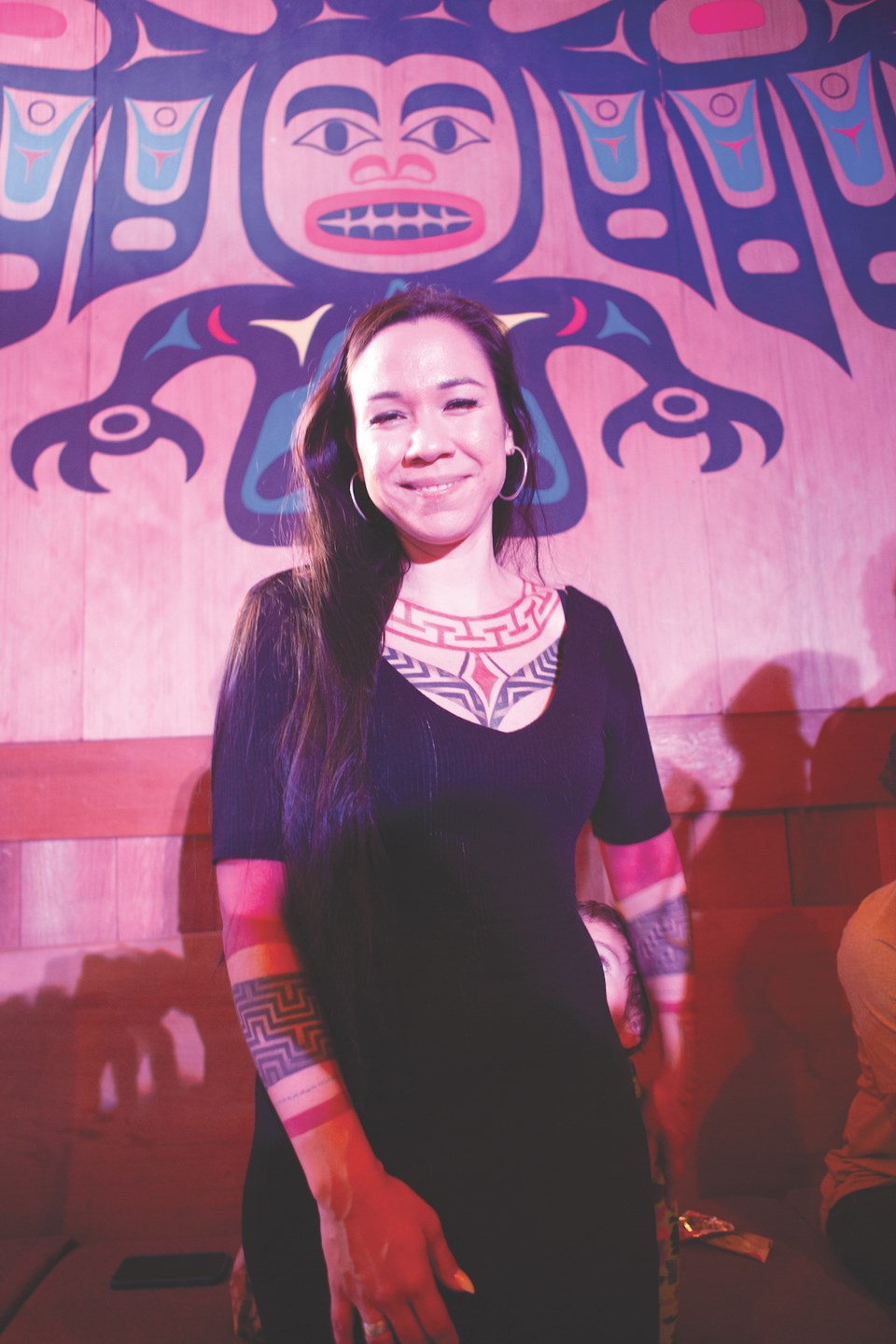A spellbinding live performance at the shíshálh Nation Longhouse crowned a week of filmmaking for a forthcoming documentary about communities healing through the power of stories.
An audience of over 100, including many children, gathered on Nov. 26 in the cedar-lined ceremonial centre east of Sechelt, filled with haze and warmth from its pot-bellied cast-iron stove. Alfonso Salinas, of the shíshálh Nation and swiya, shared anecdotes and drummed a journey song before introducing Ecko Aleck, of the Nlaka’pamux Nation.
Aleck delivered an hour-long fusion of spoken-word narratives, dance and music, tracing a path across the earthen floor in bare feet. She was accompanied by video projections she single-handedly shot, edited and scored as part of a growing multimedia repository called Legacy of the Land.
Salinas and Aleck are collaborating with Charlene SanJenko, of Splatsin in the Secwépemc Nation, to produce a feature-length film that will collect and share traditional teachings of Indigenous Elders.
In late September, telecommunications provider Telus announced funding for the project through its TELUS originals program, which since 2014 has financed more than 250 documentaries and series. Saturday’s live performance was filmed by a team of three camera operators for inclusion in the 90-minute film, tentatively titled Elders’ Project.
“Practicing our culture, something we’ve done for thousands of years, and keeping it alive, is so important,” said Salinas. “Being proud of it, being proud of who we are, [comes with] knowing our identity. For me, it’s helped me find purpose in my life. This is what I’m here for. This is why Creator put me here.”
“And to be a dad, of course,” he added, chuckling.
Aleck will serve as the documentary’s composer. As Saturday’s featured artist, Aleck’s live vocals and rhythmically-rendered narratives paid tribute to her father Terry Coyote Aleck, a residential school survivor who reported his abuser to the RCMP in 1987.
“This is probably the most emotional I’ve felt in a show,” said Aleck. “Normally I carry these gifts out there in the world, but this is a very special place to me. This longhouse is where I found my voice, and where I learned to stand strong in who I am. To bring my medicine and gifts back to this sacred space feels very special.”
Aleck’s words chronicled the emotional and cultural wounds left by the forced attendance of Indigenous children at church- and government-run residential schools, where abuse occurred regularly. Through verse, she described the complexity of her inherited identity: “My very existence is political / My blood quantum is measurable / Down to the percentage / I want to grow pieces of the history and language I do not speak / I’m caged in the ways / The system put in place / to eliminate my people.”
Admission proceeds from the longhouse presentation will support an initiative being led by Salinas to establish a traditional Indigenous Canoe Family. He is working with Elder Barbara Higgins to create a group that will paddle to traditional shíshálh homelands in Sechelt Inlet.
Salinas concluded the program with a song composed by his brother, Robert Higgins, titled We Are Here. Several young audience members beat their drums to accompany a full-bodied chorus that Salinas admitted “takes my breath away.”
“There must be a word for this whole experience other than ‘performance,’” Aleck reflected after the event. “It’s way deeper than that. But I’m still searching for that word.”
The Elders’ Project film is being co-produced by documentarian Liz Marshall, who was recognized as Best Director by the International Science Film Festival World of Knowledge for her 2020 movie Meat the Future.
“During a time of climate emergency, the world needs Indigenous land-based and medicine teachings more than ever before,” said Marshall. “It’s an honour to be a learner on this journey with the shared intentions of our equally Indigenous and settler film team.”
The Elders’ Project film is scheduled for release in August 2023.



